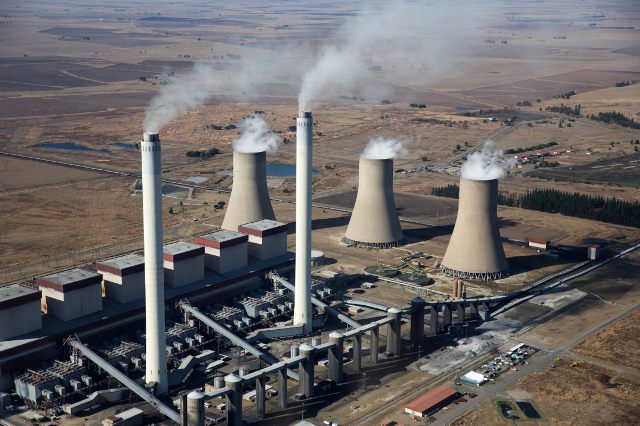Construction of 630-MW Thabametsi coal-fired power plant in South Africa is now uncertain after Korea Electric Power Corporation (Kepco) said that it will not invest in new overseas coal power ventures.
The turnaround comes ten days after South Korea’s majority state-owned utility approved the acquisition of a stake in the controversial Vung Ang 2 coal power project in Vietnam.
KEPCO chief executive Kim Jong-gap stated in an annual governmental audit hearing by the Korean National Assembly that KEPCO plans to cancel or convert to LNG two remaining overseas coal power projects in its pipeline, which includes the 1,000MW Sual 2 project in the Philippines and the 630MW Thabametsi plant in South Africa.
He also stated that KEPCO has “no plans to pursue overseas coal power projects in the future.”
This statement comes after the Minister of Trade, Industry and Energy’s announcement that KEPCO currently has no more overseas coal power projects in the pipeline after Vung Ang 2 in Vietnam.
South Korea’s recent overseas coal power projects in Indonesia and Vietnam have been met with widespread international criticism, especially given the Moon administration’s drive with the Korean Green New Deal, which aims for a “net-zero emissions society,” earlier this year, and more recently, the Korean legislature’s adoption of a climate crisis declaration last month.
There has also been much local opposition to the Sual 2 project, as well as the 1,200 MW Sual-1 Power Station, which has been operating since 1999. On October 13th, activists from the Save Sual Movement, Philippine Movement for Climate Justice, and Asian Peoples’ Movement on Debt and Development held a rally in front of the Korean embassy in the Philippines, voicing their opposition to the project. Activists also held a demonstration in Sual on the day of the National Assembly hearing on KEPCO as well.
The exchange on Thursday took place during a governmental audit hearing by the Trade, Industry, Energy, SMEs and Startups Committee in the National Assembly. Assemblywoman Lee Su-jin questioned KEPCO president Kim Jong-gap on the overseas coal investments, leading to the following admission from Kim:
“Kim Jong-gap: Out of the four [overseas coal power plants] projects, we decided to go ahead with two, and transition the other two to gas or cancel them at this point. KEPCO and its subsidiaries will not be pursuing new overseas coal power projects.”
The former two projects referred are Jawa 9, 10 in Indonesia, which was approved in June, and Vung Ang 2 in Vietnam, approved by the KEPCO board in October.
The 1,000 MW Sual 2 coal power project is estimated to cost USD 1.8 billion. According to KEPCO’s submission to the National Assembly, KEPCO was considering Doosan Heavy Industries & Construction as the tentative engineering, procurement, and construction (EPC) contractor of the project, and was in the course of arranging the financial investors.
On KEPCO’s admission, Sejong Youn, director of the overseas coal finance program at Seoul-based NGO Solutions for Our Climate, said:
“We welcome that KEPCO has finally stopped the Sual project in its tracks. This is a major victory for the Sual community’s health and our climate. It is not too late for KEPCO to take the same approach for its recent investment in Jawa 9, 10 in Indonesia and Vung Ang 2 in Vietnam. Both of these countries have adopted ambitious renewable energy plans, and converting these coal projects into gas or renewables will be far more beneficial for all parties involved.”
Lidy Nacpil, Coordinator, Asian Peoples’ Movement on Debt and Development (APMDD), said:
“We welcome the announcement of KEPCO that it will no longer build the Sual 2 power plant and hope KEPCO will show real commitment to shift away from unwise and dirty investments immediately. We ask that KEPCO reverse its decision on Vung Ang 2 and halt its financing for Jawa 9 and 10 because the climate crisis is worsening. The world needs to refrain from building new coal capacity to stay within the goal of the Paris Agreement. We also ask KEPCO not to proceed using this project to transition to gas.”
Ian Rivera, National Coordinator, Philippine Movement for Climate Justice (PMCJ), also responded to the announcement:
“We hope that this is not a false promise and that KEPCO will soon make an explicit statement that it is withdrawing from the Sual 2 project. It is time for South Korea to end its support for overseas coal. The coal-fired power projects it has supported through its financing institutions are locking developing countries into decades of fossil fuel infrastructure they can’t afford. And the climate impacts of these projects fall most heavily on the poor.”
Rolando Tandoc, Spokesperson Save Sual Movement (SSM) said:
“We were not consulted about this proposed project even though we will bear the brunt of its negative impacts. We are happy to hear that Sual 2 will not move forward. ”
South Korea remains one of the top three public financiers of overseas coal power, providing approximately US$10 billion to overseas coal power projects between 2008 and 2018 according to a 2019 study.
Global investors including Blackrock, Legal & General Investment Management, APG, and the Church Commissioners for England have warned the South Korean utility to drop overseas coal power projects, citing financial and environmental concerns.
Also Read
Construction begins on new d-school building in South Africa
Number of Chinese construction workers in Africa diminishing-report

